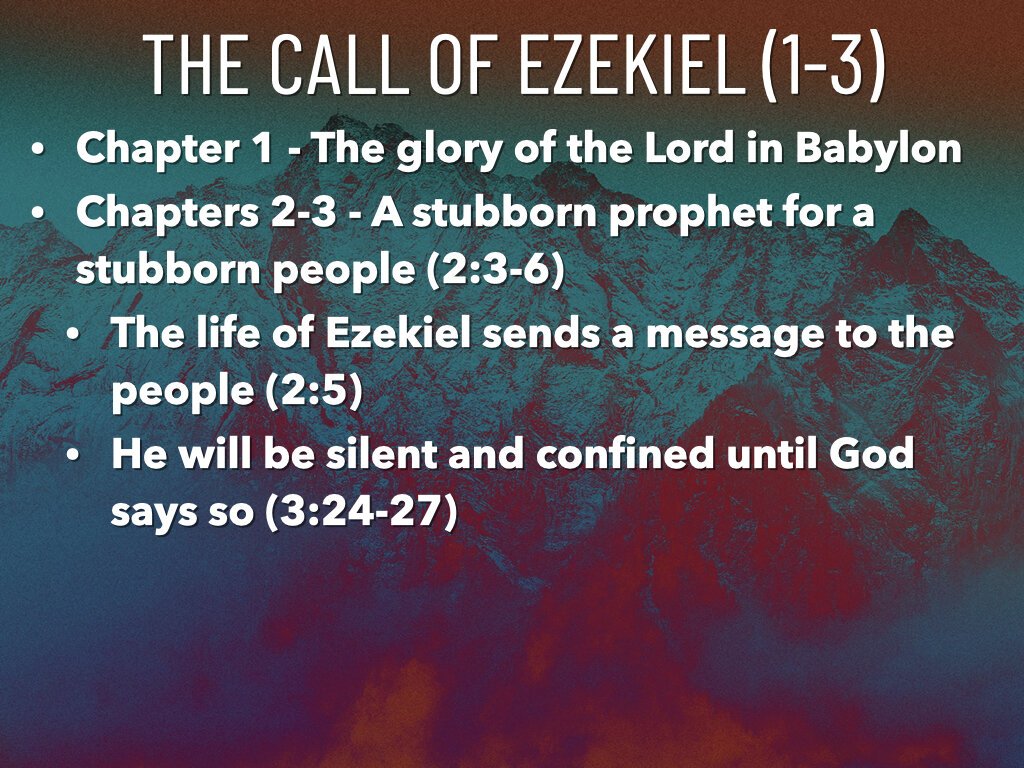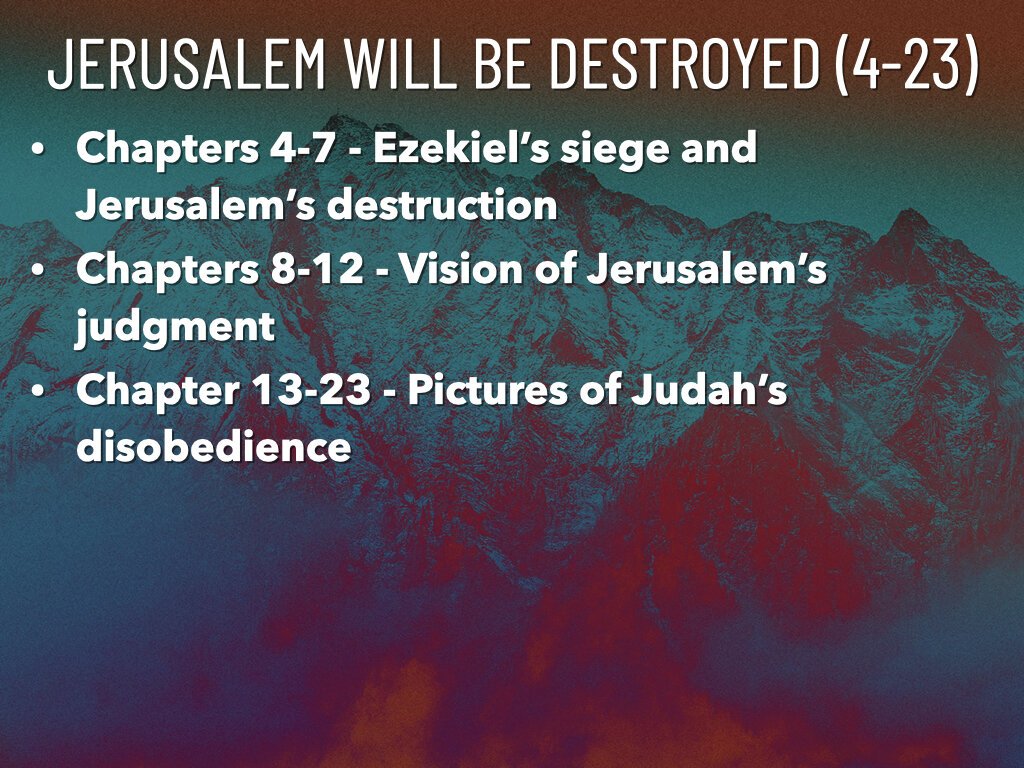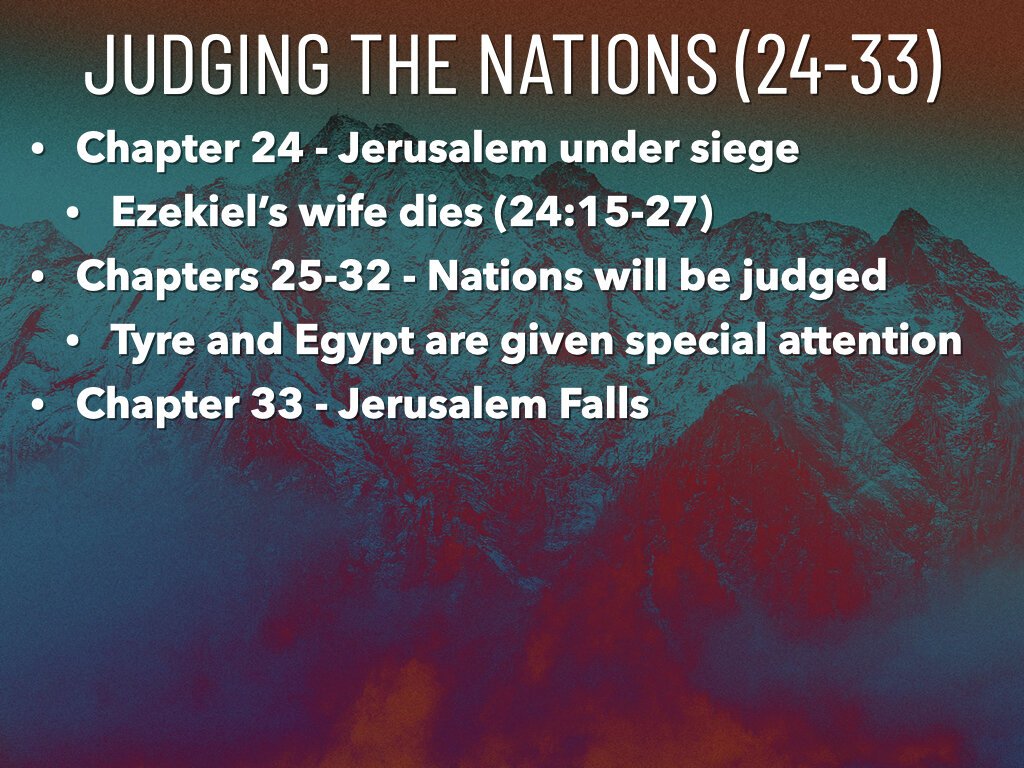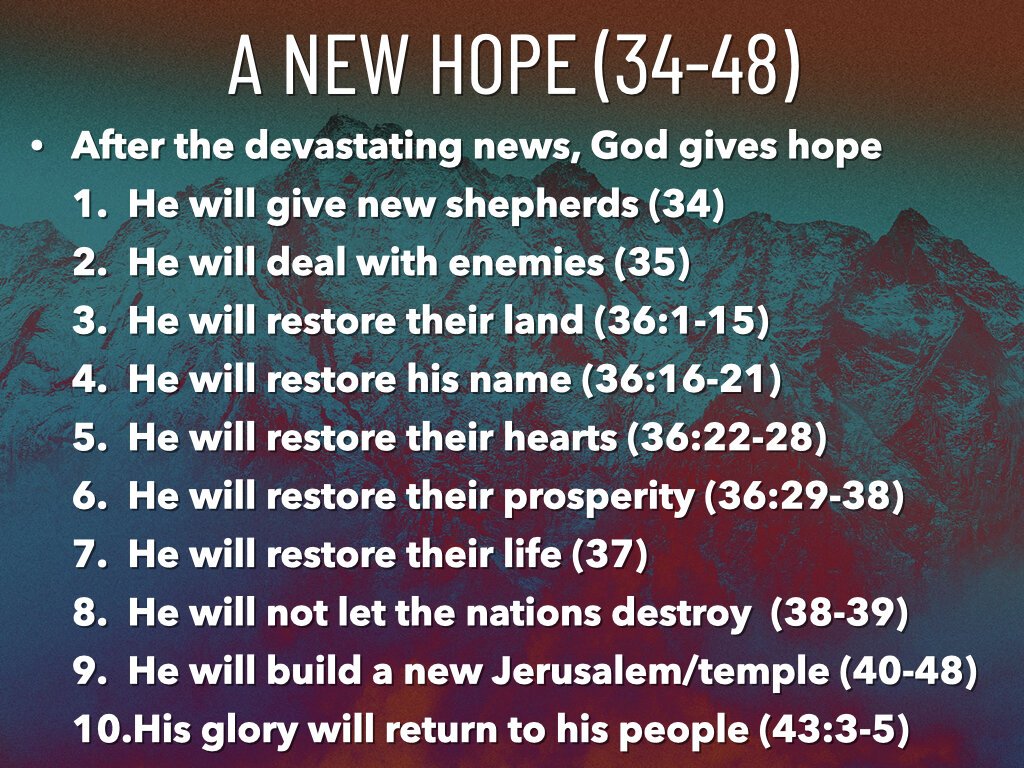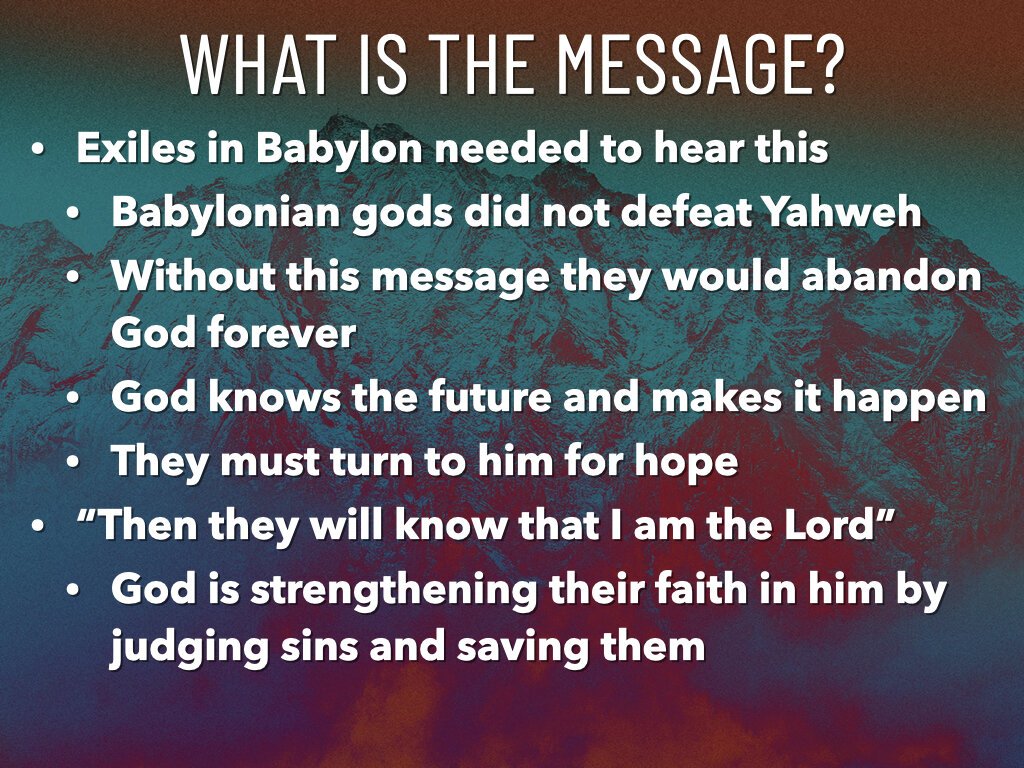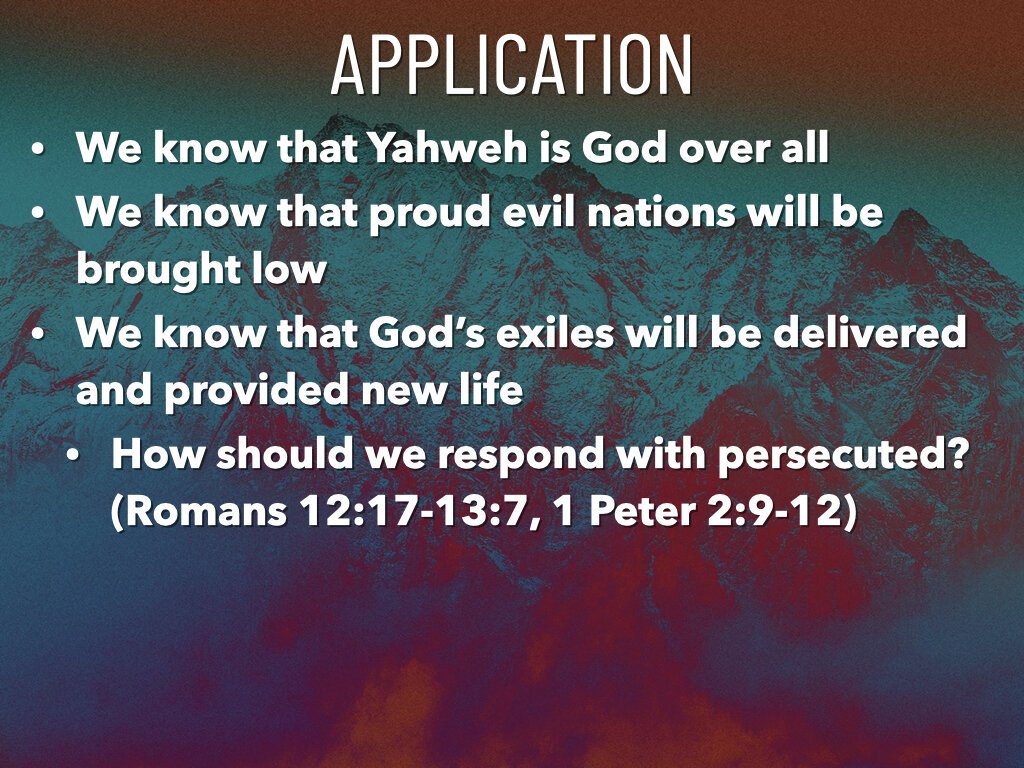They Will Know (Ezekiel)
Ezekiel is a beautiful book. It is a joy to read through and understand. In Jeremiah's book, we learn about Jerusalem's destruction from a prophet's perspective in the city. Lamentations is a detailed description of the destruction of the city. But Ezekiel gives us some insight into the minds of exiles in Babylon. As we study this book, we see a lot of images and signs being used to illustrate what Israel is doing, what God is doing, and what God has in store. I will only touch on these images to see the book as a whole. An in-depth study is coming up in the future.
The Call of Ezekiel (1-3)
Ezekiel is a priest, called to be a prophet during the year he was supposed to begin temple service. But he is not anywhere near the temple of God because he has been taken into exile to Babylon. He lives just outside of the city in a Jewish refuge type of camp by the Chebar canal.
The opening of the book tells us about the extraordinary scene of God's glory arriving in Babylon. This scene has living creatures with four faces, wheels, and wings, which would later be called Cherubim. It seems as though these Cherubim are carrying the throne of God. They are a sort of chariot that he rides on.
In Chapter 2, God speaks to him from the throne and tells him that he will be his prophet to the stubborn people he is exiled with. Listen to the description of these people.
Ezekiel 2:3--6 (ESV) --- 3 And he said to me, “Son of man, I send you to the people of Israel, to nations of rebels, who have rebelled against me. They and their fathers have transgressed against me to this very day. 4 The descendants also are impudent and stubborn: I send you to them, and you shall say to them, ‘Thus says the Lord God.’ 5 And whether they hear or refuse to hear (for they are a rebellious house) they will know that a prophet has been among them. 6 And you, son of man, be not afraid of them, nor be afraid of their words, though briers and thorns are with you and you sit on scorpions. Be not afraid of their words, nor be dismayed at their looks, for they are a rebellious house.
The rest of Chapter 2 is about Ezekiel being given a scroll with God's words to eat. Then, in Chapter 3, God makes him into a watchman for Israel. He has the responsibility of telling the people about the danger he sees. If he refuses to tell them, their blood will be on his own head.
At the end of Chapter 3, God makes Ezekiel a mute. He can only speak when God has something for him to say. On top of that, he is bound to his house. God will not allow him to come out. You can imagine how this would impact the society of that day. Everyone would be talking about the change in Ezekiel's behavior.
This transitions us into Ezekiel's first message. If you look at the book as a whole, there are three messages for the exiles:
- They learn that Jerusalem will be destroyed (4-23).
- They learn that the surrounding nations will be destroyed for taking advantage of Jerusalem's misfortune (24-33).
- They receive a message of hope for the future (34-48).
Jerusalem Will Be Destroyed (4-23)
Symbolizing Destruction (4-12)
In Chapter 4, God begins to use Ezekiel to reveal to the exiles what will occur in Jerusalem. Ezekiel has to build a model of Jerusalem on a brick, complete with a siege, camps, and battering rams. Then, he has to lie on one side for 390 days to bear Israel's punishment and 40 additional days to bear Judah's punishment. All the while, he has to eat the rations of someone under siege. This diet was a gathering of different grains to make a tiny piece of bread cooked over a cow-dung fire.
Then, in Chapter 5, he uses a sword to shave his head and beard. God wants him to act like each hair is a person in the city. Some of them are set on fire, others are thrown in the air, and he swings the sword to illustrate their death. One third is tied to his robe to be taken into captivity.
The rest of this section is full of illustrations like this to depict God's anger with Jerusalem. In Chapter 8, God picks Ezekiel up in a vision and carries him to Jerusalem to better understand what is going on. This vision lasts until Chapter 11, and it shows the idolatry that is rampant in the city. There are images of idols inside the temple! In Chapter 10, he is shown the glory of the Lord leaving the temple. Think about how devastating that is. God's presence is their only hope of protection. If he goes, they have no hope of survival. God promises to bring the exiles back to Jerusalem with a new heart and a new spirit at the end of this vision (11).
In Chapter 12, Ezekiel prepares a bag for exile and portrays Judah's king's attempted escape. He even digs through the wall of his city with his bare hands.
Further Explanation (13-23)
Chapters 13-23 tell us about the evil of Judah. They are described as a useless vine, a faithless bride, and a betraying vine in Chapters 13-16. God has done so much for them, but they always fight against him.
Chapter 18 tells us that God is just, but they call him unjust. He would not judge a righteous man or let the guilty go free, but he allows people time to correct their course or ruin their lives.
Chapter 19 shows us God's lamentation over the death of kings, Jerusalem, and Judah.
Chapter 20 describes the history of Israel's rebellion and the promise of its restoration.
Chapters 21-22 explain God's punishment for this rebellion. Then, he illustrates the need for this punishment again in Chapter 23 with Israel and Judah portrayed as sisters who betray their husband. Throughout this section, Judah is considered worse than Israel and worse than surrounding nations because of their evil.
Judging The Nations (24-33)
The next section of the book has two bookends. The first bookend tells us that Jerusalem is under siege. In the middle, we read about several nations that will also be judged. The other bookend is in Chapter 33, when Jerusalem is finally destroyed.
Jerusalem Under Siege (24)
Chapter 24 is a landmark chapter.
Ezekiel 24:1--2 (ESV) --- 1 In the ninth year, in the tenth month, on the tenth day of the month, the word of the Lord came to me: 2 “Son of man, write down the name of this day, this very day. The king of Babylon has laid siege to Jerusalem this very day.
The prophecy of Ezekiel is beginning to be fulfilled. Jerusalem has been placed under siege, and they will be destroyed. At this time, God just wants his people to know how he feels about this. The second half of this chapter (15-27) describes the death of Ezekiel's wife.
Imagine hearing this from the Lord.
Ezekiel 24:15--18 (ESV) --- 15 The word of the Lord came to me: 16 “Son of man, behold, I am about to take the delight of your eyes away from you at a stroke; yet you shall not mourn or weep, nor shall your tears run down. 17 Sigh, but not aloud; make no mourning for the dead. Bind on your turban, and put your shoes on your feet; do not cover your lips, nor eat the bread of men.” 18 So I spoke to the people in the morning, and at evening my wife died. And on the next morning I did as I was commanded.
What a tragedy! That is the point that God wants to get across to the people. They ask Ezekiel, "What does this sign mean?"
Ezekiel 24:21 (ESV) --- 21 ‘Say to the house of Israel, Thus says the Lord God: Behold, I will profane my sanctuary, the pride of your power, the delight of your eyes, and the yearning of your soul, and your sons and your daughters whom you left behind shall fall by the sword.
God feels like Ezekiel. His delight has been taken away from him because of the rebellion of the people. The siege will end with the destruction of his temple, and this hurts God's heart.
Nations (25)
This section is devoted to condemning various nations. The Ammonites, Moabites, Edomites, and Philistines are condemned in Chapter 25. All of these nations are close to Israel and Judah and took advantage of their misfortune.
Tyre (26-28)
In Chapters 26-28, we read about the city of Tyre. Tyre is a very prosperous city that God condemns for becoming proud. He laments over their destruction because they are a beautiful city by the sea. But they and Sidon will be destroyed because of their evil. At the end of Chapter 28, we find a promise that Judah will be rebuilt to live in peace and security.
Egypt (29-32)
Chapters 29-32 are about the destruction of Egypt for their evil. He compares the splendor of Egypt's kingdom to Assyria, but he also says that they will be thrown into the pit like Assyria.
Jerusalem Falls (33)
In Chapter 33, he reveals that Jerusalem has finally fallen. But before he reveals this, he repeats some information. He tells Ezekiel that he is a watchman again. Then, he asks Israel why they have chosen death. He laid out his justice very clearly. If they turn from their wickedness, he would forgive. But they have refused to turn!
So we learn that Jerusalem is destroyed.
A New Hope (34-48)
We can't imagine how devastating this news would have been for the Jews. Jerusalem was what put them on the map. The destruction of their capital city and the rejection of God would have made life meaningless. But before the punishment, the prophets have given a hint at some future hope. God has made promises in every prophetic book we have studied. He promises destruction at the hand of the Babylonians, then he promises restoration. Ezekiel is no different. The final chapters are full of hope. Listen to the promises of God in these chapters. Here are ten blessings that are promised. I'm sure more could be added to this list, but this will give you an idea of what God is promising.
- He will give them new shepherds (34)
- He will deal with their enemies (35)
- He will restore their land (36:1-15)
- He will restore his name among them (36:16-21)
- He will restore their hearts (36:22-28)
- He will restore their prosperity (36:29-38)
- He will restore their life (37)
- He will not let the nations destroy them (38-39)
- He will build a new Jerusalem with a new temple (40-48)
- His glory will dwell among his people forever (43:3-5)
What Is The Message?
This book is loaded with incredible illustrations and signs, but what does it all mean? If you were an exile in Babylon, think about how critical Ezekiel's message would be. If any other nation goes through what Judah goes through, it would be done with Yahweh. They would think that he really wasn't a god after all and that he couldn't protect his people. But this situation has revealed the consequences of abandoning God. God is living and active.
Amazingly, he has the power to tell us what will happen in the future and bring it about. But that is not the most fantastic part. The part that blows my mind is that he will start over with these evil people. Even after all that they have done to rebel against him, he is willing to accept them and make them his people again. They would be crazy to give up on a god like that. He is very much able to bring about what he has promised, and he has future promises in store for them. His love is truly never-ending.
The end of this book reveals how important it is for the people of God to turn from their rebellious ways, trust in God, and be careful to do his commandments. If he can predict the future and bring about whatever he wants to happen, who is like him? After being brought to their lowest point, God is now the only place they can look to for hope, and he wants them to come to him. He even promises great things.
This brings us to the message of the book. Throughout this book, there is one repeated phrase, "They will know that I am the Lord." This book is written so that they may believe that God is the only true God and that he is who he says he is back in Exodus 34.
Exodus 34:6--7 (ESV) --- 6 The Lord passed before him and proclaimed, “The Lord, the Lord, a God merciful and gracious, slow to anger, and abounding in steadfast love and faithfulness, 7 keeping steadfast love for thousands, forgiving iniquity and transgression and sin, but who will by no means clear the guilty, visiting the iniquity of the fathers on the children and the children’s children, to the third and the fourth generation.”
Application
What about us? When we read this book, do we know that the God of Israel is the Lord? The message of this book extends through all generations. It shows us the power that God has over the nations of the earth. The judgments that we read about in Ezekiel lay a blueprint for how God judges the nations. He destroys all of the countries who lift themselves up with arrogance over other nations. Those who mock God's people or seek to destroy them, God will ultimately judge. All the world should read this book and see that God is over all. The pride and arrogance of nations like Tyre and Sidon and Egypt will be judged. These promises remain for us.
Romans 12:17--13:7 (ESV) --- 17 Repay no one evil for evil, but give thought to do what is honorable in the sight of all. 18 If possible, so far as it depends on you, live peaceably with all. 19 Beloved, never avenge yourselves, but leave it to the wrath of God, for it is written, “Vengeance is mine, I will repay, says the Lord.” 20 To the contrary, “if your enemy is hungry, feed him; if he is thirsty, give him something to drink; for by so doing you will heap burning coals on his head.” 21 Do not be overcome by evil, but overcome evil with good. 1 Let every person be subject to the governing authorities. For there is no authority except from God, and those that exist have been instituted by God. 2 Therefore whoever resists the authorities resists what God has appointed, and those who resist will incur judgment. 3 For rulers are not a terror to good conduct, but to bad. Would you have no fear of the one who is in authority? Then do what is good, and you will receive his approval, 4 for he is God’s servant for your good. But if you do wrong, be afraid, for he does not bear the sword in vain. For he is the servant of God, an avenger who carries out God’s wrath on the wrongdoer. 5 Therefore one must be in subjection, not only to avoid God’s wrath but also for the sake of conscience. 6 For because of this you also pay taxes, for the authorities are ministers of God, attending to this very thing. 7 Pay to all what is owed to them: taxes to whom taxes are owed, revenue to whom revenue is owed, respect to whom respect is owed, honor to whom honor is owed.
God will take care of the injustice and cruelty that might be shown to us. Vengeance belongs to him, not us. He is the Lord, and he knows what he is doing. All great nations who abandon God will be judged. Next year we will begin a new series of lessons that focus on the hope we have in the promises of God. This year, it may be said that we have been brought to our lowest point so far. We haven't reached rock bottom yet, but it doesn't matter because of the hope we have in Christ. Like the exiles in Babylon, we are faced with the horrible reality of our own sinful rebellion. We have escaped the punishment we deserve, and now we must put our trust in God with the hope of future glory.


